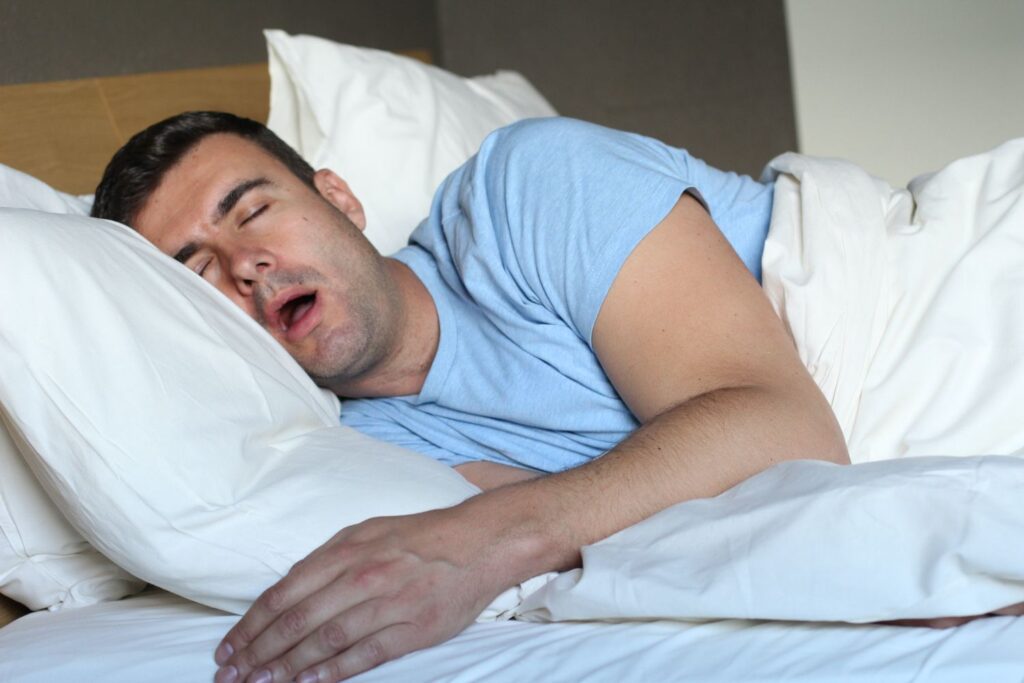A night guard refers to a mouthguard-like appliance that a dental patient can wear as they sleep. Some people may worry that a bulky fixture worn over the teeth will disrupt their ability to sleep. But individualized attention ensures a comfortable and secure fit that will allow you to fall asleep as you normally would.
In fact, a night guard can offer a number of oral health benefits, especially because certain behaviors might present during sleep that you cannot otherwise address due to being unconscious. Schedule a dental consultation with your local dentist to determine how a night guard will help your unique smile. And read on to learn three advantages you can experience if you receive a custom-made night guard from your dentist.

Resolve Mild Sleep Apnea
Have you ever found yourself gasping awake or waking feeling not well rested? These symptoms could point to sleep apnea, a condition in which the soft tissue at the back of the throat relaxes enough to collapse and briefly block your airway as you sleep. While not acutely life-threatening, untreated sleep apnea could lead to many health complications.
A doctor can treat sleep apnea, but in mild cases, your dentist can also help you. They can provide you with a specifically designed night guard that will keep your jaw aligned in such a way to prevent this soft tissue collapse when worn.
Then you can improve your quality of sleep and prevent other health issues. Learn more about how dentistry can resolve your sleep apnea by calling your dentist today.
Relieve Chronic Jaw Strain
Has your jaw been feeling stiff and sore lately? These uncomfortable symptoms can occur when you exert excess strain on your jaw. If you do not notice yourself clenching or grinding your teeth during the day, this might happen when you are not aware of it, such as during sleep.
If your jaw continues to endure this strain, the muscles around the joint will become inflamed and you may develop temporomandibular joint disorders. Your dentist can help you relieve strain on your jaw with a night guard.
When worn as you sleep, the night guard will cushion the teeth from clenching and grinding that happens while unconscious. And it therefore blocks the strain from these behaviors from spreading to your jaw. Treat TMJ before you experience worsening symptoms, like jaw dysfunction and pain.
Stop Dental Damage from Bruxism
Grinding and clenching your teeth as you sleep, a habit called bruxism, can harm more than just your jaw. Untreated bruxism will apply pressure to the teeth, which though durable, could crack, chip, or fracture under high amounts of strain.
This tooth breakage will disrupt the look of your smile and make your teeth vulnerable to further harm. So avoid this dental damage with preventative efforts, including wearing a night guard. The guard will block excess pressure from hurting your teeth as well as existing dental work such as fillings or crowns.
Frequently Asked Questions
Can a night guard help with headaches caused by grinding?
Yes, a night guard can reduce headaches caused by teeth grinding by cushioning your bite and relieving pressure on your jaw muscles. It helps prevent the muscle tension that often leads to tension headaches. Many patients find relief after consistent night guard use.
How do I know if I’m grinding my teeth at night if I sleep alone?
Signs include waking up with jaw pain or soreness, headaches, worn or flattened teeth, and sometimes a partner or family member may hear grinding noises. You might also notice increased tooth sensitivity or damage during dental exams. We can confirm grinding by examining your teeth and recommending monitoring options.
Can a night guard prevent enamel erosion?
A night guard protects your teeth from the mechanical wear caused by grinding, but doesn’t prevent erosion caused by acids from diet or acid reflux. It acts as a physical barrier to stop enamel from being worn down by friction. To protect against erosion, you’ll need to manage dietary habits and other causes alongside wearing a night guard.
Will wearing a night guard affect how I speak at night?
Most people adapt quickly and don’t notice significant speech changes while wearing a night guard during sleep. Since you’re asleep, minor differences in speech aren’t usually a concern. If you wear a night guard during the day, you might experience some temporary lisp or difficulty, but this improves with practice.
Can I drink water while wearing a night guard?
It’s best to remove your night guard before drinking water to avoid contaminating it or causing bacteria buildup. Drinking while wearing it could also cause discomfort or choking risks if you accidentally swallow water. Keep your night guard clean and dry when not in use.
What does it mean if I drool more while wearing my night guard?
Increased drooling is common when you first start wearing a night guard. Your mouth produces more saliva in response to the foreign object. This usually lessens as your body gets used to the night guard over time.
Can I wear a night guard with braces or other orthodontic appliances?
You should consult your orthodontist before wearing a night guard with braces or other appliances. Custom guards can fit around braces or retainers, but over-the-counter options usually won’t fit properly. Dr. Morris can recommend or create a night guard that protects your teeth without interfering with your orthodontic treatment.
